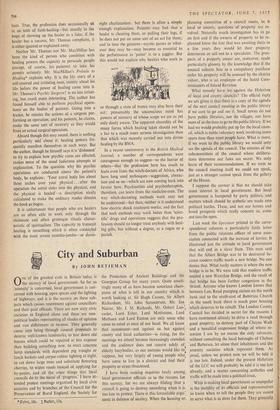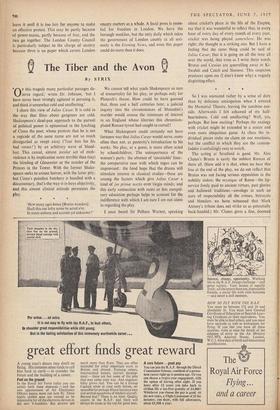City and Suburban
By JOHN BETJEMAN ONE of the greatest evils in Britain today is the secrecy of local government. So far as `amenity' is concerned, local government is con- cerned with housing, open spaces and the lighting of highways, and it is the secrecy on these sub- jects which causes resentment against councillors and their paid officials. There are now sixty civic societies in England alone and these are non- political bodies representing all shades of opinion and vast differences in income. They generally come into being through council proposals to destroy well-known landmarks, to tear down old houses which could be repaired at less expense than building something new, to erect concrete lamp standards with dependent pig troughs or lunch baskets and corpse-colour lighting at night, to cut down large trees and substitute flowering cherries, to widen roads instead of applying for by-passes, and all the other things that local councils do in the name of `progress.' I have at- tended protest meetings organised by local civic societies and by branches of the Council for the Preservation of Rural England, the Society for • Faber, 16s. ,t, Barker, 15s. the Protection of Ancient Buildings and the Georgian Group for many years. Quite unwit- tingly many of us have become notorious cham-, pions of what is left in our country which is worth looking at. Sir Hugh Casson, Sir Albert Richardson, Mr. John Summerson, Mr. Ian Nairne, Mr. J. M. Richards, Mr. Osbert Lan-‘,,, caster, Lord Esher, Lord Mottistone, Lord Methuen and Lord Euston are only some who come to mind at once of our band. We all know that resentment—not against us but against, county and local authorities—is rising, for the, meetings we attend become increasingly crowded, and the audience does not consist solely off elderly busybodies, as our enemies would like to suppose, but very largely of young people whot, have come to live in a district and find their, property or street threatened.
I have been making inquiries lately among, local government officials as to the reasons for, this secrecy, for we are always finding that a council is going to destroy something when it is too late to protest, There is this formidable argu-: ment in defence of secrecy. When the housing or, planning committee of a council meets, be it local or county, questions of property are in- volved. Naturally much investigation has to go on first and if the owners of property to be re- planned knew the fate that was awaiting them in a few years they would let their property deteriorate or sell out to a speculator. The pros- pects of a prpperty owner are, moreover, made particularly gloomy by the knowledge that if the council submits him to a compulsory purchase order his property will be assessed by the district valuer, who is an employee of the hated Coin- missioners of Inland Revenue.
What remedy have we against the Hitlerism of local and county councils? The official reply we are given is that there is a copy of the agenda of the next council meeting in the public library if we care to go and see it. Small towns do not have public libraries, nor do villages, nor have most of us the time to go to the public library. If we had we would probably put up for the local coun- cil, which is noble voluntary work involving more spare time than most people have. What is more, if we went to the public library we would only see the agenda of the council. The minutes of the subcommittees of the council whose delibera- tions determine our fates are secret. We only learn of their recommendations. If we went to the council meeting itself we could not speak, just as a stranger cannot speak from the gallery of the House.
I suppose the answer is that we should take more interest in local government. But local goVerriment is hampered by party politics, and matters which should be aesthetic are made into political battles. These, and not' our homes and loved prospects which really concern us, come out into the open.
Last week the Spectator printed in the corre- spondence columns a particularly futile letter from the public relations officer of some asso- ciation connected with the increase of lorries. It illustrated just the attitude to local government that will end in a slave State. This man said that the Albert Bridge was to be destroyed be- cause modern traffic needs a new bridge. No one denies that. What really matters is where the new bridge is to be. We were told that modern traffic needed a new Waterloo Bridge, and the result of that bridge has been further congestion in the Strand. Anyone who knows London knows that between Lots Road pumping station on the north bank and to the south-east of Battersea Church on the south bank there is much poor housing which deserves to be rebuilt. The London County Council has decided in secret for the reasons I have mentioned already to drive a road through good property, to destroy part of Cheyne Walk and a beautiful 'suspension bridge of whose re- tention I am by no means the only advocate, without consulting the local boroughs of Chelsea and Battersea, let alone their inhabitants and the amenity societies which represent them. As usual, unless we protest now we will be told it is too late. Indeed, under the present Hitlerism of the LCC we will probably be told it is too late already, and a matter concerning aesthetics and traffic will be made into a political issue, What is making local government so unpopular is the inability of its officials and representatives to know when to tell the people they are meant to serve what is in store for them. They generally leave it until it is too late for anyone to make an effective protest. This may be partly because of power-mania, partly because of fear, and the two go together. The London County Council is particularly subject to the charge of secrecy because thrre is no paper which covers London county matters as a whole. A local press is essen- tial for freedom in London. We have the borough weeklies, but the only daily which takes the government of London county at all seri- ously is the Evening News, and even this paper could do more than it does.



































 Previous page
Previous page